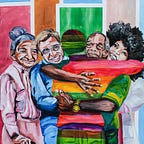Together: Resisting, Supporting, Healing
Statement by Achim Steiner, the UNDP Administrator
The COVID-19 pandemic has exacerbated the inequalities across the world. Lesbian, gay, bisexual, transgender, intersex, and queer (LGBTIQ+) people who are already experiencing violence and discrimination on the basis of their sexual orientation or gender identity, are amongst those most affected by COVID-19. In the wake of the pandemic, they have been subject to additional stigmatization, discrimination, hate speech and attacks. In some countries, emergency powers adopted to respond to the COVID-19 pandemic are intentionally or unintentionally discriminating against LGBTIQ+ people. Given overloaded health systems, the treatment of LGBTIQ+ people may be interrupted or deprioritized. And the pandemic is having a devastating effect on the mental health and wellbeing of LGBTIQ+ people, particularly young people.
Yet in the face of the pandemic, LGBTIQ+ communities are organising to resist, support, and heal. They are offering peer support and community-led organisations are working with the Joint UN Programme on HIV/AIDS to ensure the provision of HIV services for LGBTIQ+ people. Human rights defenders and National Human Rights Institutions are raising their voices on the impact of COVID-19 measures on LGBTIQ+ people.
The United Nations Development Programme (UNDP) is working with partners in 72 countries to support LGBTIQ+ people during the pandemic and beyond. That includes everything from training 2,900 human rights defenders on LGBTIQ+ issues in the Caribbean; working with LGBTIQ+ youth organisations in India and Thailand through the Youth Co:Lab programme on social entrepreneurship; supporting the Eurasian Key Populations Health Network to measure the impacts of COVID-19 on trans health; or working through the UNDP-Global Fund partnership in Zimbabwe to ensure the continuation of vital HIV and health services and psycho-social support for LGBTIQ+ people, including through the use of digital technologies.
UNDP is taking a human rights-based approach to COVID-19 that puts people at the very centre of the response. It is based on the principles of participation and inclusion; accountability and the rule of law; as well as non-discrimination and equality. As the UN Secretary-General has said, “In building forward together, we have a unique and historic opportunity to forge a world where every person is afforded dignity; where every society can withstand crises; where everyone’s future is built upon a foundation of inalienable rights”. On the International Day Against Homophobia, Biphobia and Transphobia (IDAHOBIT), UNDP stands with LGBTIQ+ people and partners to resist injustice, support community engagement, and help transform healing into empowerment.
This statement was originally published by the United Nations Development Programme on the International Day Against Homophobia, Biphobia and Transphobia.
